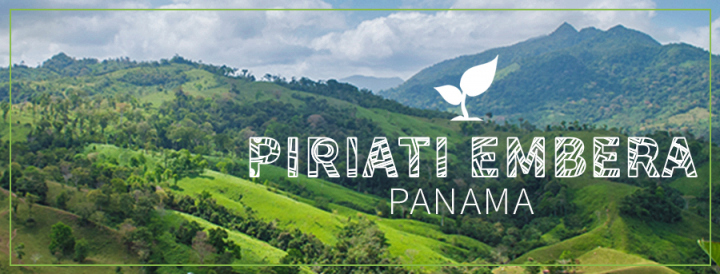About Piriatí Emberá
Piriati Emberá is an indigenous Emberá community of about 165 homes
and 780 inhabitants. It is located in the district of Tortí along the Pan
American highway in East Panama province. Piriati Emberá is a farming
and artisan community. Families produce crops like rice, plantains, yucca,
and corn for their own consumption as well as to sell to intermediaries.
Many women and some men sell traditional artisan crafts as well. As one
of Global Brigades Panama’s holistic communities, medical/dental brigades
conduct mobile clinics, business brigades is working to create a community
bank, and Environmental brigades have built a greenhouse structure and
are working to complete a reforestation project, while continuing to support
sustainable farming practices through work with the model farm.
Piriatí Emberá's Environmental Challenge
The majority of community members depend on the land for their livelihoods
including income, daily subsistence, traditional art crafts, and construction of
traditional Emberá family dwellings. The environment is currently threatened
by both external forces in the region at large and internal unsustainable
cultural norms that result from lack of education. All of Panama, and in
recent decades Eastern Panama in particular, has been threatened by rapid
deforestation and soil erosion due to cattle ranching, logging, and
colonization of highly forested areas. Large tracts of land at extremely low prices
has favored rapid, unsustainable expansion and attracted teak tree farms and cattle ranches, both of which devastate native species. On a micro level, the Emberá communities of East Panama practice slash and burn agriculture, a method that depletes nutrients every crop cycle and over time will lead to completely infertile land. These practices combined with monoculture style and limited crop varieties in the area threaten these communities most precious resource—their land. In addition, there is no existing system of waste management in the community. Most families will burn their trash or throw it in the river, for lack of options and awareness of the harmful effects of these practices.
The Environmental Solution for Piriatí Emberá
Environmental Action
Environmental Brigades’ has developed a project to promote sustainable agricultural techniques through the creation of Model Farms that have the end goal of families replicating this model for themselves on their own land. The Environmental Team works with the Environmental Committee in Piriatí Emberá, which is made of 15 women and 2 men, to perpetuate the Model Farm project.
The Model Farm consists of different sections within the small plot: crops and livestock. Some examples of crops include: corn, rice, beans, plantains, and yuca. Examples of livestock include: chickens, tilapia, and iguanas. Starting in 2015, volunteers participating in Environmental Brigades help construct, plant, maintain, perform follow-up, harvest, and educate community members about the techniques and projects within the Model Farm.
Unsustainable farming techniques degrade the health of the soil. When the soil becomes contaminated, whether through harmful farming practices or improper waste management, the well-being of those who depend on the soil is at risk. Global Brigades’ focus on fighting the degradation of soil promotes environmental sustainability, which affects food security and financial sustainability of the communities we work with.
Environmental Education
In addition to the hands on projects, an important part of Environmental Brigades work in Piriati Embera is the education workshops given by brigaders with the support of the Environmental team. Past workshop topics include organic fertilizers, composts, pest and disease control, plant health, greenhouse maintenance, and waste management and the ecological effects of improper waste disposal. Future brigaders will reinforce these topics with the schoolchildren, as most of the adults have received environmental education.
| Environmental Brigades Chapters that Worked in Piriatí Emberá |
|||
| Environmental Brigades Chapter | Month | Volunteers | Model Farm Components |
| Marquette University | March 2013 | 24 | - |
| Penn State University | May 2013 | 19 | - |
| Chapman University | June 2013 | 14 | - |
| UCLA, UCI, UCSD, UCSB | June 2013 | 28 | - |
| UC Riverside and Drexel University | August 2013 |
15 |
- |
| Ball State University | December 2013 |
15 |
- |
| Penn State University and University of Virginia | March 2014 |
18 |
- |
| Indiana University | March 2014 | 12 | - |
| DePaul University and Northwestern University | March 2014 | 22 | - |
| University of Pittsburgh and Boston University | May 2014 | 27 | - |
| UIUC and University of Connecticut | May 2014 | 8 | - |
| CUNY Macaulay | August 2014 | 30 | - |
| University of New Hampshire & Columbia University | January 2015 | 16 |
Rice Paddy (construction), Chicken Coop (construction) |
| Penn State University & CU Boulder | May 2015 | 16 |
Eliminate weeds, Plaintains (planting), Corn (planting), Cassava (planting), Drainage ditch (construction) |
Visit Other Programs in Piriatí Emberá
Global Brigades strives to implement a model of Holistic Development in communities through a system of collectively implementing health, economic, and education initiatives to strategically meet a community's development goals. Learn more about the other programs being implemented in Piriatí Emberá:
![]() Business
Business ![]() Dental
Dental ![]() Human Rights
Human Rights ![]() Medical
Medical ![]() Microfinance
Microfinance ![]() Public Health
Public Health
| Model Farm Project Overview |
|
| Beneficiaries | n/a |
| Volunteers | 32 |
| Total Components of the Model Farm Implemented |
5 |
| Hours of Education |
2 |
| Additional Information |
| General Community Profile |
| Environmental Committee Profile |
| Pre-Brigade Lesson Plan |
| On-Brigade Lesson Plan |
| Education Guide |
